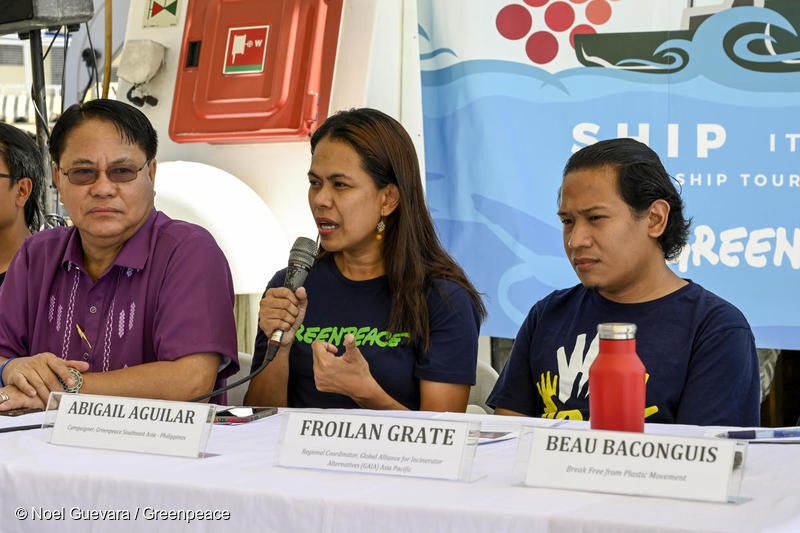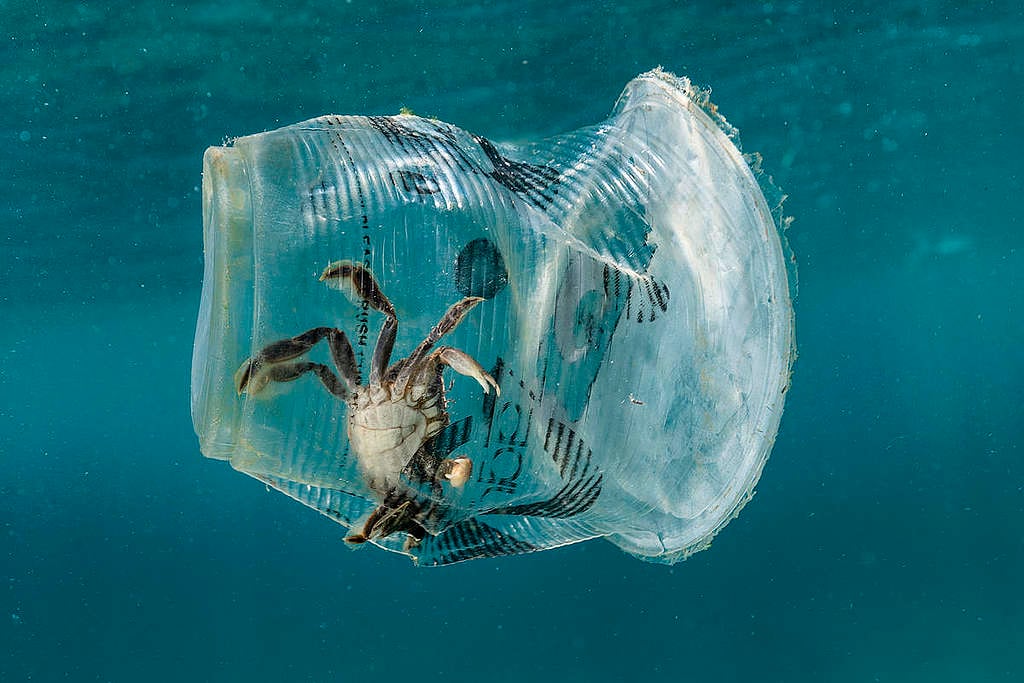01 March 2019, Manila, Philippines – The iconic Rainbow Warrior is back in the Philippines to tackle the plastic pollution crisis. As part of the global Ship it Back tour, the Greenpeace vessel highlights the role of plastic producers for the pollution in Manila Bay, and the Filipinos’ efforts in tackling the plastic crisis.
Greenpeace Philippines pointed out that big corporations in Europe and the US blight the efforts of Filipinos who want the waterways, oceans, streets and communities clean. Last January, the Philippine government spearheaded the cleanup of Manila Bay, and produced positive results for the beaches of the Bay. However, this cannot be said of Manila Bay’s situation under water, as an underwater exploration by the Metro Manila Development Authority captured the murky situation and littered seabed [1].
“Most people are now aware of the plastic pollution crisis and the harm it brings to our environment and our communities. But to really solve the plastic pollution problem in Manila Bay and everywhere else in the Philippines, the big corporations must reduce their single-use plastic production. One sachet produced, used, and disposed is one sachet that pollutes our country,” said Abigail Aguilar, campaigner of Greenpeace Southeast Asia – Philippines.

Since 2017, Greenpeace, as part of the bigger Break Free from Plastic movement [2], named and shamed big fast-moving consumer goods (FMCG) [3] corporations who are producing products wrapped in single-use, unrecyclable plastic packaging. Last year, the report ‘A Crisis of Convenience’ implicated top brands [4], and said that ‘the promotion of branded products – food, drink, cosmetics and cleaners – in one-way packaging, is one of the drivers of mass production, over-consumption and is significantly contributing to the plastic pollution crisis’.
“In my journeys and everywhere I go onboard the Greenpeace ships, I notice the increasing levels of plastic pollution on our land and in our seas. I am in solidarity with the Filipinos in their resolve to move forward to a future free from plastic pollution. Sadly, this crisis has wrongfully accused Filipinos and many developing countries as the culprit behind this mess — this is not the case. Big corporations have to do their part if people in the Philippines and neighboring countries are to find their way out of this predicament,” said Captain Daniel Rizzotti of the Rainbow Warrior.
The Rainbow Warrior’s Ship it Back tour is part of a global campaign that targets companies that produce massive amounts of single-use plastic that pollute the world’s oceans. On its 19-day journey in the Philippines, the iconic ship will stop in Manila and Cebu. After the tour in the Philippines, the campaign will focus on activities in the Netherlands and Switzerland, to further pressure FMCG companies to reduce their overall production of single-use plastics and invest in alternative delivery systems.
Notes to the editors:
[1] MMDA reveals video of Manila Bay’s murky waters. https://www.gmanetwork.com/news/news/metro/683952/mmda-reveals-video-of-manila-bay-s-murky-waters/story/
[2] Nestlé, Unilever, P&G among worst offenders for plastic pollution in Philippines in beach audit.
http://www.greenpeace.org/seasia/ph/press/releases/Nestle-Unilever-PG-among-worst-offenders-for-plastic-pollution-in-Philippines-in-beach-audit/
[3] FMCG includes any product with a short shelf life and typically a relatively low cost, such as soft drinks, food or toiletries. They are typically sold at low margins but very high volumes, with a high turnover of the product.
[4] A Crisis of Convenience: The corporations behind the plastics pollution pandemic.
https://www.greenpeace.org/international/publication/19007/a-crisis-of-convenience-the-corporations-behind-the-plastics-pollution-pandemic/
Media Contact:
Abigail Aguilar, Campaigner, Greenpeace Southeast Asia – Philippines
Email: [email protected] | Mobile: +63 998 589 2551
Angelica Carballo Pago, Media Campaigner, Greenpeace Southeast Asia – Philippines
Email: [email protected] | Mobile: +63 949 889 1332

